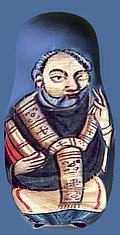
1. Ethnic and Christian discourse in the early Middle Ages
Several studies deal with a new discourse inspired by the Bible about identity and ethnicity (5th to 9th century). The Bible as 'repertory of identification' deals amongst others with exegetical texts of Late Antiquity, mostly commentaries on the Old Testament and its reception up to the Carolingian period. Christian communities and their media explores other Christian genres (hagiography, sermons, letters) as widespread media of dissemination for emerging concepts of identity. Semantics and narratives of ethnicity examines early medieval terminology for ethnicity in both the Latin and Greek language and vernacular languages.
2. Allegiance and agency – social and political uses of identity in early medieval Europe
The studies of this sub-project deal with ethnic identity as a motivation and explanation for actions. Being Roman after Rome examines which was called 'Roman' in the early Middle Ages, for example in papal Rome, the Alps or the Adriatic region. Regional and ethnic identities in Roman and post-imperial Europe highlights the long-term development of ethnic and regional identities in the Roman provinces and border areas.
3. Medieval identities as an interdisciplinary field of study
These studies aim at interdisciplinary cooperation with other fields of study. Social cohesion, identity and religion from a global perspective supplements a comparative study for Latin Europe, Byzantium and the Islamic world, investigated by Spezialforschungsbereich (SFB) VISCOM (starting from March 2011). Identity, material objects and cultural transfer focuses on an interdisciplinary collaboration with archaeologists, from which a joint workshop and possibly a collaborative volume and an exemplary study are planned. Nations in retrospect – the modern significance of medieval ethnic and religious identities looks into the on-going methodological reflection. Genetic history and medieval ethnicity aims to promote the methodological debate between geneticists, anthropologists and historians.
Dr. Karl Lueger-Ring 1
1010 Wien






